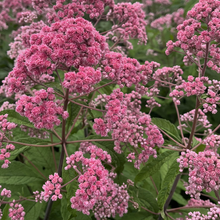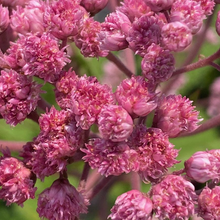Eupatorium Eutrochium 'Fistulosum Jojo' is a striking cultivar of Hollow Joe Pye Weed that towers over borders with its bold vertical presence. Large domed clusters of dusky pink flowers bloom atop sturdy purple tinged stems attracting a wide array of pollinators through the late summer months. The lance shaped leaves form in whorls, giving it a distinctive architectural structure that makes it a focal point in naturalistic plantings or habitat gardens.
Height & Spread: 60 - 84 in x 36 - 48 in
Bloom Time: Mid summer to early fall
Light Requirements: Full sun to part sun
Soil Preference: Moist to wet soil, rich in organic matter
Watering Needs: High; thrives in consistently moist conditions
Deer Resistance: Not favored by deer due to aromatic foliage
Native Status
This cultivar is derived from Eupatorium fistulosum, a species native to eastern and central North America, especially in moist meadows, streambanks, and ditches.
WILDLIFE & INSECTS
Butterflies
- Highly attractive to large butterflies such as Monarchs, Eastern Tiger Swallowtails, and Great Spangled Fritillaries for late season nectar.
Bees
- Supports a wide range of native bees including bumblebees, leafcutter bees, and sweat bees drawn to its dense clusters of tubular florets.
Moths
- Visited by nocturnal moths including the Hummingbird Clearwing and Virginia Ctenucha during late summer evenings.
Birds
- Songbirds such as American Goldfinches and sparrows feed on the seeds in fall and perch atop dried stems for cover and observation.
Spacing & Landscape Use
Spacing Recommendations:
- Space 36 - 48 in apart to accommodate the plant’s full size and encourage airflow between clumps.
Landscape Placement:
- Well suited for pollinator gardens, wet meadows, bioswales, or the back of borders where its stature and late bloom time contribute to structure and seasonal succession.
Companion Plants
- Monarda fistulosa (Wild Bergamot) - Offers lavender blooms and aromatic foliage that attract bees and butterflies in midsummer.
- Rudbeckia fulgida (Black Eyed Susan) - Provides sunny yellow blooms that contrast well with Joe Pye’s tall pink flower heads.
- Asclepias incarnata (Swamp Milkweed) - Shares moist habitat preferences and supports Monarch butterflies at all life stages.
- Pycnanthemum muticum (Mountain Mint) - A low growing spreading mint with silvery bracts and dense clusters of nectar rich flowers that attract an array of beneficial insects.
- Vernonia noveboracensis (New York Ironweed) - Provides upright purple blooms that bloom concurrently and add vertical contrast.



